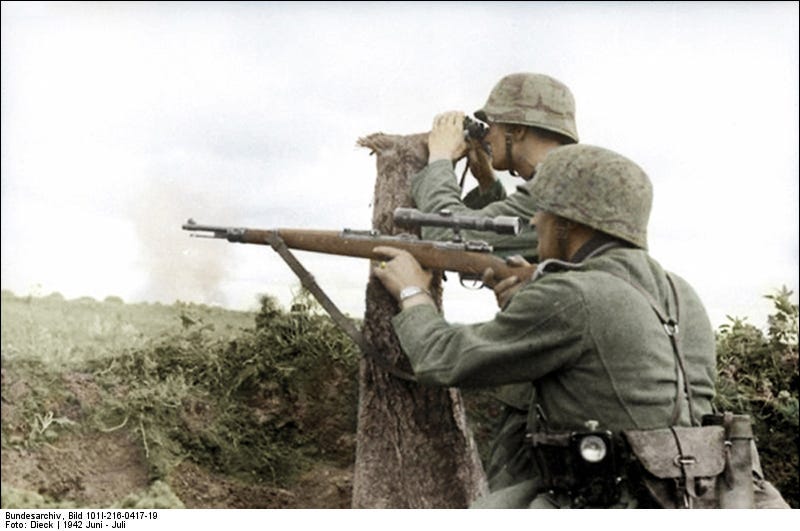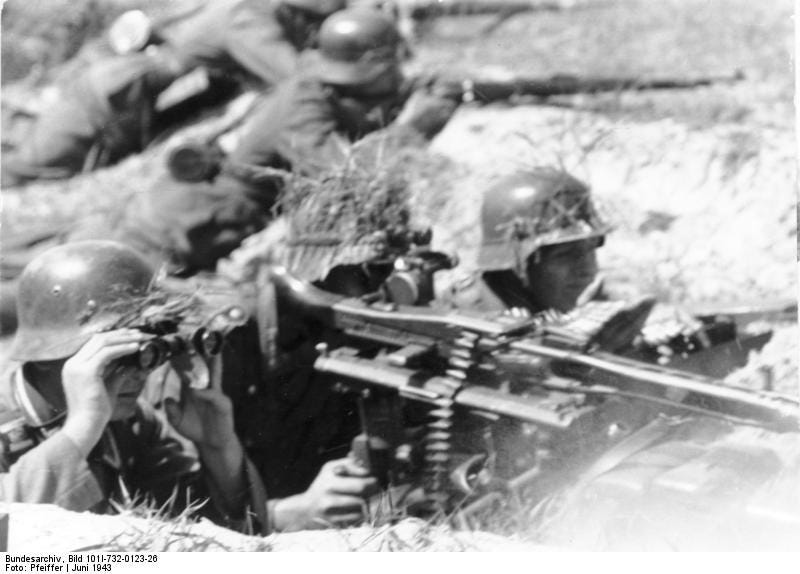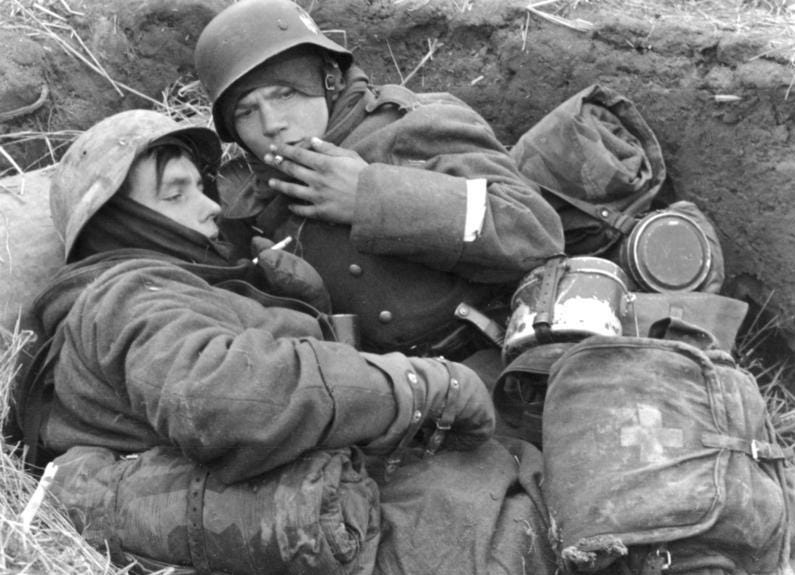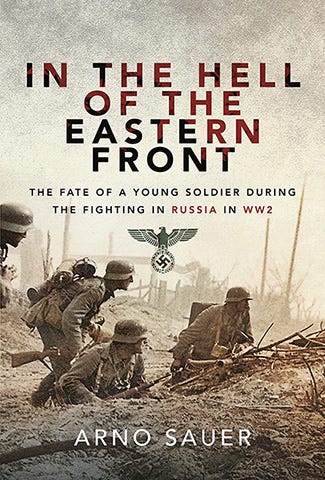The Hell of the Eastern Front
24th September 1942: Hitler sacks his Chief of Staff as casualties mount on the Eastern Front
The deteriorating relationship between Hitler and his Generals came to a culmination on the 24th September when he sacked his Chief of Staff, Franz Halder. It was now apparent that the objective for 1942, the capture of the oilfields in the Caucasus, was not going to be achieved. The scale of casualties suffered by the Wehrmacht were alarming1 and there seemed no prospect that they would not keep growing.
Deep down their must have been a realisation that the war was looking increasingly unwinnable. The Soviet state had not quickly collapsed when they 'kicked in the door' in 1941 - so now they were locked into a long war of attrition.
Hitler's belief that an 'unconquerable will' would be sufficient to ensure a German victory was increasingly at odds with the military facts. As a professional soldier Franz Halder was the man who was responsible for presenting Hitler with these unpalatable facts.
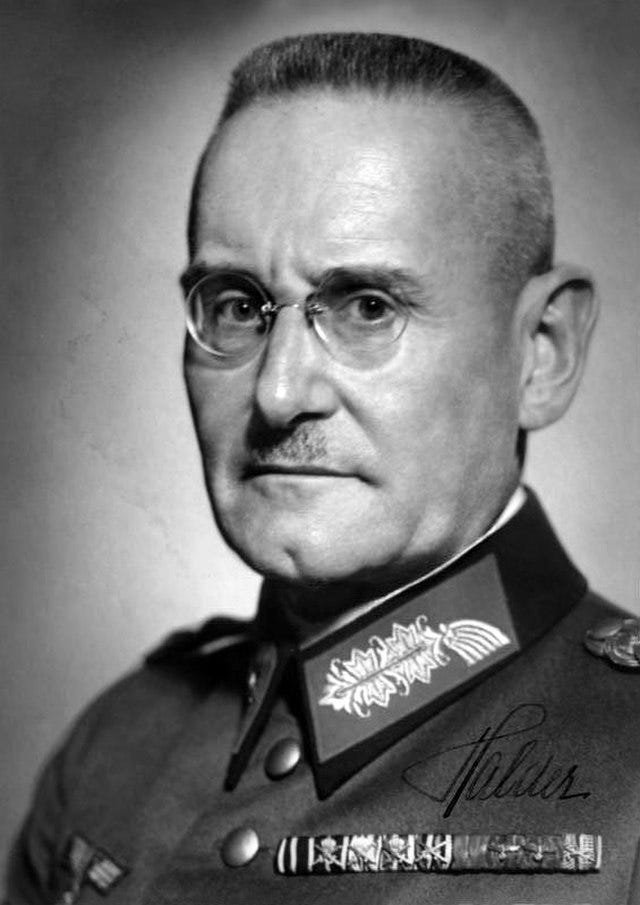
Halder's diary2 was largely confined to military matters and he only made limited comment on his relationship with Hitler:
24th September 1942
After situation conference, farewell by the Fuhrer: My nerves are worn out, also his nerves are no longer fresh. We must part. "Necessity for educating the General Staffs in fanatical faith in the Idea." He is determined to enforce his will also in the Army.
For the men on the ground there was no escape. The Wehrmacht might be better trained, organised and equipped than the Red Army - but this was not enough.
Fritz Sauer3 had arrived with the 132nd Division on line outside Leningrad at the end of August:
Only two weeks after we had taken up our positions and extended them into a labyrinth of trenches, foxholes and earth bunkers, we were expecting the first large-scale assault on our positions by the Russians after extended artillery fire. They probably wanted to test the fighting strength of the 132nd Infantry Division, new to this section of the front, and stormed towards us with inconceivable masses of men.
We were waiting under safe cover and saw with horror what was approaching us from afar. It was dreadful! The entire horizon, as far as eye could see, was black with people. There must be thousands being thrown into battle. A large part of the soldiers carried no weapons and were driven with pistols by the following political commissars into our defensive fire.
If a Russian fell who carried a rifle, one of the unarmed men picked it up and continued storming forward. That a soldier was sent into battle without a weapon was actually inconceivable in the Wehrmacht. Only in the so-called probation units, also called punishment battalions, did such a thing allegedly happen.
When the attacking masses were in firing range, our defensive fire let loose from all weapons upon command. With our old-fashioned but high-quality and precise 98k carbines and only six bullets we could never have stopped these masses.
‘That we could defend ourselves successfully was owed to the modern new MG 42 machine guns. They were relatively light, easy to handle and had an extremely high cadence of 1,500 shots per minute.’
That we could defend ourselves successfully was owed to the modern new MG 42 machine guns4. They were relatively light, easy to handle and had an extremely high cadence of 1,500 shots per minute. However, the weapon also used an enormous amount of ammunition, which had to be provided by the MG shooters II and III or had to be dragged to it during battle. It was to our great advantage that overheated barrels could be changed within a few seconds with asbestos gloves.
Our defences included a number of the MG 42s and the Russian assault collapsed under their crossfire. The few survivors flooded in panic back into their initial positions; left behind were countless dead and many screaming wounded who slowly bled out. It was cruel to have to watch, and even worse to listen to, this spectacle. We observed the events in abject terror. On our side some comrades had fallen or been wounded, but all my friends remained unharmed: Markus, Toni, Walter, Robert, Georg, Uli, Herbert - we were all still together.
These attacks were repeated in the course of the next few days again and again in a similar manner with varying intensity. Sometimes there was more artillery fire, sometimes more attacking infantry. If the opportunity offered itself to us to advance under sufficient cover into our manoeuvring area, we extricated shouting or screaming Red Army soldiers, provided first aid to them and brought these poor bastards to our field dressing station for initial treatment.
During these quite dangerous explorations we would often observe that a corpse would at first lay on its back and then later on its belly — a sign that others always examined the pockets of the dead for something useful, especially food and cigarettes.
‘Our own losses had increased considerably in the meantime, but were still manageable in their magnitude. Yet the Russians became stronger and I stronger, and most of all more and more.’
We felt pity for all these fallen young men, whether Russians or our own comrades. We did not harbour any hatred for the enemy, and always the thought was there that these young men, too, all had mothers, fathers and families who would never see their fallen family members again. Here war showed its hideous face, and we would have liked nothing better than to take back these terrible events.
The soldier rarely encountered his hero’s death on the battlefield in the form of a painless heart or head shot. The rule was instead a horrendous carnage and murder by mutilation, tearing of limbs and laceration of bodies. The cloying stench of death of the many unrecovered corpses constantly befouled the air and became unbearable when the wind blew from the east.
Our own losses had increased considerably in the meantime, but were still manageable in their magnitude. Yet the Russians became stronger and I stronger, and most of all more and more.
At the beginning of the third week of our mission a piece of shrapnel tore off Paul Severin’s arm. Shortly after, Jakob Schmitz received a shot in the lungs. After quick field recovery and good medical treatment both could be saved. Paul and Jakob were transported back home on an ambulance train. For both of them the war was over, but at what cost?
In the fourth week Robert was lying watch in the foremost ditch with me. He was very restless and stared time and again out of our trench across the raised protective earth wall towards the enemy positions.
I said to him several times: ‘Just stay put down here under cover. If the Ivan (as we called our Russian adversaries) attacks, we will notice and learn this early enough.’
Yet Robert ignored my warnings. Suddenly I heard a dull impact. When he had lifted his head once more above the protective wall, a shot had hit him full frontal in the forehead through the steel helmet.
The Russian sniper had done a perfect job. Robert was killed immediately. I was paralysed from shock. Desperation, anger, grief and helplessness threatened to overcome me, but I was not even allowed to shout or cry loudly.
Only recently Halder had recorded the statistics for casualties since the launch of Operation Barbarossa in June 1941.
Casualties: 22 June, 1941 - 10 September 1942 in the East:
Killed : 336,349 including 12,385 Officers
Wounded : 1,226,941 including 34,525 Officers
Missing : 75,990 including 1,056 Officers
Total : 1,637,280 including 47,966 Officers
Halder was to finish the war in a concentration camp after being suspected of involvement in the July 1944 bomb plot. The Halder Diaries can be found online.
This excerpt from In the Hell of the Eastern Front: The Fate of a Young Soldier During the Fighting in Russia in WW2 appears by kind permission of Pen & Sword Books Ltd. Copyright remains with the author.
The significance of the new MG 42 machine gun was also noted by Hans Heinz Rehfeldt who was Wounded on the Eastern Front at this time.


